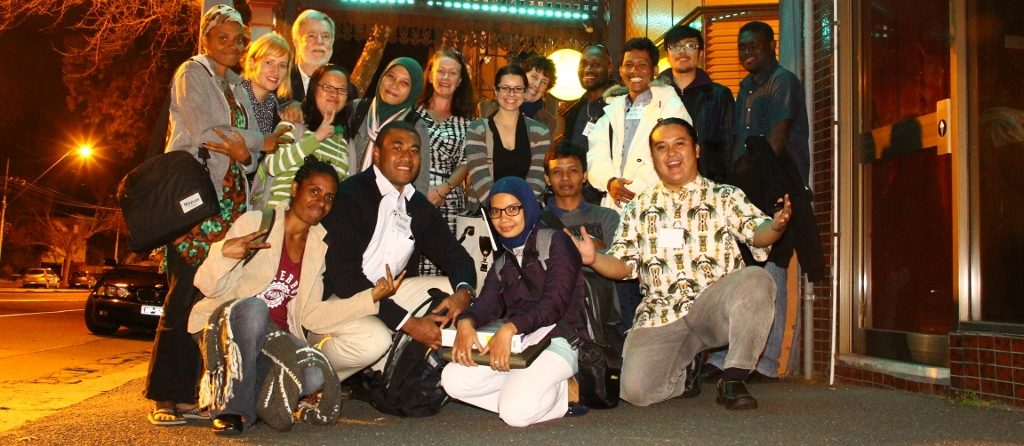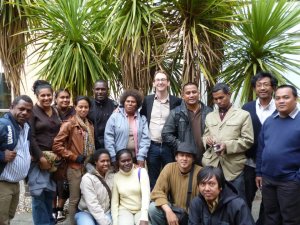As small island developing states, including the pacific, gear up towards the Conference of the Parties meeting in Durban next week to once again reinforce the urgent plea of saving their people and countries from the effects of climate change, Tasmania Greens Senator says Australia could do more to help pacific island countries deal with climate change in funding a Secretariat for the Alliance of Small Island Developing States.
AOSIS is a non-governmental organization of low lying atolls and coastal countries established since 1990 to consolidate the voices of Small Island Developing States (SIDS) to address global warming. AOSIS has been very active from its inception and 15 out of the 42 members and observers from all around the world are pacific island countries.
Speaking to pacific journalists last Friday following a presentation at the 2011 Environmental Politics and Conflict in an Age of Digital Media Symposium at the University of Tasmania, in Australia, Greens Senator Christine Milne says the first thing Australia could do is to provide funding for a Secretariat for AOSIS.
“ I understand that the pacific is being given the chair of the AOSIS and the first thing Australia could do is give a couple of million dollars to the pacific to provide a secretariat for AOSIS, because if AOSIS is to maintain a good profile and capacity in global climate talks it needs to have a secretariat support, so the first thing Australia could do is to get involved and give more support at that level.”
Senator Milne adds that Australia also needs to separate climate finance from the aid budget for transparency purposes.
“Secondly they should be separating out climate finance faster and long term from the aid budget because what Australia has done is that is has put the aid budget and climate finance together and so Australian people are told constantly that we are doing the right thing with their climate funding plus the increase of the aid budget but actually if you separate them out, you’ll see that we are not.”
“So the next thing Australia needs to do is to make sure that it has transparency and it’s aid funding is separate from climate financing.”
The Tasmanian Greens Senator also spoke of the need to increase capacity building with pacific government departments by allowing people to come to work in Australian government departments such as the Great Barrier Reef Park Authority.
“I worked really hard to get the coral reefs of New Caledonia, for example, listed as world heritage and I worked very hard on that and am delighted that we succeeded in doing that a couple of years ago, but obviously there’s a huge amount that could be learnt from the management of the Great Barrier Reef Marine Park, PNG could learn from those fantastic coral reefs, but right through the pacific there’s a whole range of issues.
In terms of assistance with adaptation, certainly assisting with know-how and technology that enables people to be able to keep being able to produce food where they live in light of the rising sea levels and salt water incursion is really important as well, plus a whole range of things.”
“But also there has to be a long term plan and this is what nobody is talking about and it goes to what I mentioned hearing Tuvalu says in the global talks in Nairobi – who will take my people? – hearing a pacific leader stand up and say that if the world knew that six countries were going to disappear but didn’t know which six, maybe people would be a bit more focused in acting on climate change and I thought that was a really good way of putting it because even with all the adaptation that will occur in the pacific, there are going to be some places like Kiribati and Tuvalu, for example, where ultimately people are going to have to move and we need to be thinking about how people can move and maintain their cultural identity and communities when they do move.”
So I think there’s a lot we could be doing but the first thing we should be doing is acknowledging that climate change is real and already creating substantial problems and internal migration, loss of burial and cultural sites, agricultural capacity and fresh water right now.”
Meanwhile on the question of the lack of coverage of climate change issues in pacific island countries by the Australian media, Senator Milne says the Australian media does not cover in a factual way the existing impact of climate change on pacific island countries.
She says it is extremely rare to find a photograph prominently placed in the Australian print media or stories prominently placed in current affairs or news bulletins about the impacts of storm surge or of any of the extreme weather events or issues such as salt water incursion, loss of capacity to grow food and loss of fresh water.
“You just don’t see those photographs in the Australian media or the stories, and if you do, they are placed as the sort of stories as human interest not related to news coverage of why the world needs to take action of climate change so it’s more of a travel log story than a front page story saying these are the existing consequences of climate change, that’s why we have to take action.
And the reason they’re not there is because if you say that, it makes it much harder for people to argue that there is no such thing as climate change, it’s not happening and it won’t happen for another hundred years, it’s going to cost us too much therefore we don’t need to do much about it – so it completely contradicts the line of argument that the Murdoch Press in particular want to take and that’s why it’s an inconvenient story that doesn’t get covered.”
Senator Christine Milner was interviewed by Vere Raicola of the Fiji Times, Rozalee Nongebatu of the Solomon Islands Broadcasting Corporation and Rikamati Nare Kiribati’s Broadcasting Commission who are currently doing a Climate Change Reporting fellowship in Australia under the Australian Leadership Award Scheme.
The three pacific journalists are part of a group of 15 journalists from the Asia Pacific region who are undertaking the training coordinated by the Asia Pacific Journalism Centre in Melbourne and Tasmania.
ENDS/////



